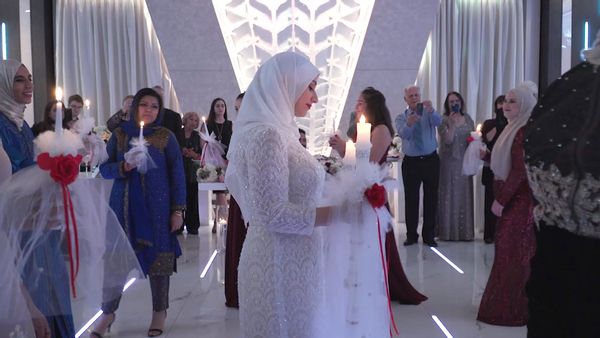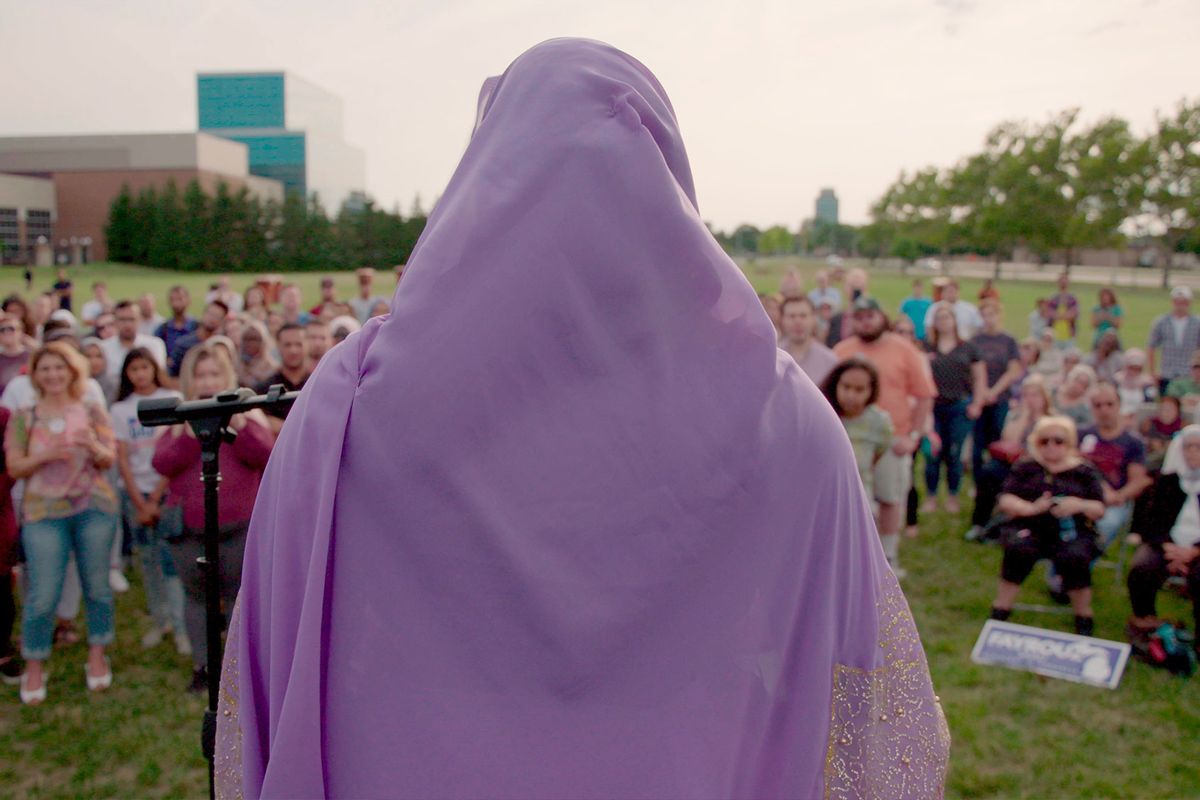The compelling documentary, "An Act of Worship," chronicles three decades of discrimination and hatred towards Muslim Americans. Juxtaposing recollections of abuse and bullying with home movies of families celebrating life in America, Pakistani-American filmmaker Nausheen Dadabhoy underscores the cultural and mental health issues that many Muslims — especially youths — have absorbed living in a country that has loudly and repeatedly expressed racism and Islamophobia.
Several interviewees movingly describe how their efforts to assimilate forced them to "lose their cultural truth," rejecting their religion, headscarves, and identity in order to blend in and be less feared. Other segments examine how families have been separated or were under surveillance. Dadabhoy chronicles the shift in how Muslims in America have been treated from the time of the Iran Hostage Crisis, through the 1991 Gulf War, the Oklahoma City bombing, 9/11, the 2001 Patriot Act, the 2013 Boston Marathon, and the Muslim Ban enacted under twice-impeached, one-term President Donald Trump.
In addition to these stories, "An Act of Worship" profiles three young female activists – Aber, Khadega, and Ameena – who advocate for rights and social justice while trying to maintain a sense of dignity in a country that continues to dehumanize this segment of the population.
Salon spoke with Dadabhoy on the eve of her film's world premiere at the Tribeca Film Festival.
"That generation of kids born after 9/11 are so much better at being themselves. It's so cliched, but they are unapologetically Muslim."
I was struck by the ways the Muslim Americans you interviewed all talked about hiding their religion and culture — as If it was something to be ashamed of — and how their efforts to assimilate and be "more American" were often forcing them to lose their identity and sense of self. One of the subjects of your film crystalizes that when she explains that they "are becoming the very stereotype they were trying to avoid." Can you talk about that Catch-22?
I feel like that conversation about assimilation has progressed so much. Someone like Khadega and that generation of kids born after 9/11 are so much better at being themselves. It's so cliched, but they are unapologetically Muslim. There is a lot of me in the film; I narrate one of the first pieces of voiceover. For my generation — my parents came over during the Iran Hostage crisis — they got prank phone calls and were very afraid. After 9/11, they received threats. They had neighbors who sent us really nasty letters. I also think it's important to remember that a lot of that generation of Muslims who came to the U.S. in the 1970s, '80s, and '90s, came after some kind of political upheaval. If not, there were certainly things you couldn't say about the government. I don't think my parents know how political this film is. Their attitude was "Don't say anything. Don't rock the boat. Keep your head down. That's how we'll stay safe." A lot of us absorbed that, and my sister was bullied in school for being different, and the only way to mitigate that was to try not to be different.
The film is an exploration of figuring out why this new generation are so powerful and sure of themselves. What happened? I think our community shifted, and they built a lot of power over the last 20 years, so these kids have an infrastructure and resources that we didn't have. My mom went to her first protest in 2020 against the Muslim Ban. Her generation is absorbing what these younger kids are introducing into our community. I'm not saying that everyone in community is like that. People I met had parents who protested. It just was not the experience I had.
Likewise, the mental health issues that developed for these Muslim Americans who tried not to think of identity is very powerful. There is talk of suicide and numbing depression with drugs. What observation do you have about the impact of this on the Muslim American community?
I think that there is a lot of trauma in our community. What was sad to realize that if I'm talking to Aber, who grew up in New York — her parents are from Palestine, and mine are from Pakistan — there is shared trauma that we can bond over. Of course, there are beautiful things we can bond over, like our immigrant background, but shared trauma is a big part of it. One of the things we realized is how after 9/11 people did not say they were Pakistani American, but Muslim American. It's been part of our identity formation in this country. I want to say "us" very carefully. The film is very much from the frame of parents who came here as immigrants, or [people] who immigrated here. It's from the lens of the immigrant Muslim community. We have not captured the African American or Latinx Muslim experience.
"Yes, these terrible things happened but there is also beauty in our experiences. How can we look at those too?"
Part of what we want to do with our film and our impact campaign is do a lot of healing for our community. How can we start to decenter trauma and address it? There is so much unacknowledged trauma in the community. We would ask people about incidents of Islamophobia, and they would either brush them off or start to cry. How do we start to address, acknowledge and heal from it? We hope that storytelling is a part of it. Our film is a counternarrative of our last 30 years, it's a jumping-off point for people to think of personal counternarrative. Yes, these terrible things happened but there is also beauty in our experiences. How can we look at those too?
What can you say about how people respond to or combat Islamophobia?
I made a movie. I watched the 2016 election with one of my producers, and I remember seeing a friend the next day, who is a gay Muslim man, and he's said, "I'm not going to go back to Pakistan. That is not an option for me." He can't live openly there; he also has a partner here. We have to do something about this. We can do something about this. Showing up for my community was making this movie. Everyone has a different approach. For some people, it is not going to be activism, but the quiet way they can be who they are authentically or how they just take care of each other in these times of crisis.
 Aber in Nausheen Dadabhoy's "An Act Of Worship" (Capital K Pictures)
Aber in Nausheen Dadabhoy's "An Act Of Worship" (Capital K Pictures)
How did you find the three participants in your film, Aber, Khadega, and Ameena?
We found a lot of women working in community organizing spaces and as activists. I was working with CAIR, the Council on American Islamic Relations, in Los Angeles. My sister was an attorney at the chapter. Her boss was Ameena Mirza Qazi, the attorney in the film. When the protests were happening at the airport, I saw Ameena in action and was in awe. "Let me put a mic on you and film you." Luckily, she was along for the ride. We filmed for many years. CAIR LA helped us find other activists. We went to different communities and asked, "Who were the activists?" Literally every community said, "There is this amazing young woman . . ." Where are the men? There are women leading the charge, so this film is going to be about them. They are on the front lines. I'm not exaggerating.
The film touches on the headscarf debate. I liked it when one interviewee said she chooses to wear the headscarf as a form of resistance, which makes it a political act. What are your thoughts on this? It can be so polarizing.
I used to wear a scarf also. That predates 9/11. I wore one when I was in high school, and for me, it was very much an act of devotion. Talking to people making this film, for some cultures, primarily Arab cultures, it's just part of the culture. It doesn't have to do with religious devotion. In Pakistan, a lot of women don't cover their hair. They cover it differently. It's culturally how they do it. In some Arab cultures, you hit puberty and you start covering your hair; it's not religious, it's cultural. But what did happen, and I remember having this conversation with a friend of mine after 9/11, it was very political. I want to be outwardly Muslim. I want to show my faith and have people see that I am Muslim and I'm not going to hide it. For some people it was, "I'm going to show them the best part of Islam. I'm going to wear the scarf and be a good person so now try coming at me with your anti-Muslim sentiments." That's so unfair, the work you have to do to take all that on. I didn't do that, but I think a lot of women did.
Want a daily wrap-up of all the news and commentary Salon has to offer? Subscribe to our morning newsletter, Crash Course.
What message of hope do you have for your community?
Ultimately, my film is about creating a different narrative for ourselves and for us to see ourselves in all the beauty and nuance in our story that hasn't really been seen enough in American popular culture and media. But I also remember that during one of the versions of Trump's Muslim Ban, I was filming with Ameena, and I had read about the Ban and was so depressed and I filmed an interview with her, and I was like "We're going to be OK." There are amazing people like her and so many others who are not going to let things like this stand. I find my hope in our community.
More stories to check out:

Shares